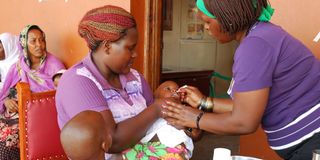Should we celebrate Health Day?

What you need to know:
- If our health is closely linked to our planet, how true is that to the local people or the billionaires whose livelihood and income sustenance is based on activities that interfere with human health and the planet?
The seventh day of April is World Health Day and will entail international celebration that glorify the anniversary of the founding of the World Health Organisation (WHO) in 1948.
Globally, health is an indispensable precursor to continuity of human existence and development. The captivating theme for World Health Day 2022 is Our Planet, Our Health. The multi-diversity of life on the planet earth is crucial to our planet and to our wellness as human beings due to reciprocation involved. With the advancement in science and technology as well as population increase in the world, nature is under pressure as never before due to the growing need for land, water, minerals, food, medicine, energy, income and other human activities, causing pollution and environment destruction.
Just like mass burning that were reported quite often in the Amazon and other parts of the world, locally in Africa and in my region Uganda, many people annually wipe tears from mass burning of bushes by local hunters that often kill humans, destroy enterprising forests, destroy wild life and eco systems and most significantly, produced volumes and volumes of dangerous smoke/fumes into the planet.
Even our local industries and factories seems to focus more on corporate social responsibility to the surrounding people and less on regulating the volumes and effects of the poisonous fumes and wastes emitted into the planet.
As if that is not enough, the supremacy race among the so called super powers of the world coupled with the increasing manufacturing of nuclear weapons where countries keep on accusing each other for the deadly weapons of mass destruction and other missiles that are often tested in broad day light on the environmental natural resources are serious threat to healthy human existence thereby traumatising mankind worldwide.
Studies reveal that the world is losing biodiversity up to ten thousand times faster than it was disappearing 100 years ago yet biodiversity is a major factor in nature’s resilience. Further, it is estimated that one million premature deaths per year are attributable to known avoidable environmental risks. Our planet is on the verge of a climate crisis due to endless production of greenhouse gases including carbon dioxide and methane by knowledgeable human beings.
If our health is closely linked to our planet, how true is that to the local people or the billionaires whose livelihood and income sustenance is based on activities that interfere with human health and the planet?
The quest for protection, preservation and mass literacy campaign on the subject matter should heavily engrave all societal niches and strands of human socialisation and income generation bases. Wealth creation, livelihood and global human health should be highly debated and scrutinise in regards to environmental damage so that humans are put to task to revisit their actions and therefore turn to become change agents so that we all enjoy good health on our own planet.
Risks and medical ailment resulting from human activities must be disclosed and integrated into health science and health education campaigns across mass media.
The debate about the planet should also involve debates, service and action oriented researches and service provision.
Attempts to regulate mass bush burning should be localised and modern technology used so that the culprits are educated and punished appropriately.
In Uganda, the need to go beyond; sensitisation campaigns, tree planting, reforestation, regulation of charcoal production, waste management and alternative energy source education will save our health and planet.
Benard Okot Kasozi, Senior psychosocial research and advocacy officer, Refugee Law Project-Gulu Field Office.




